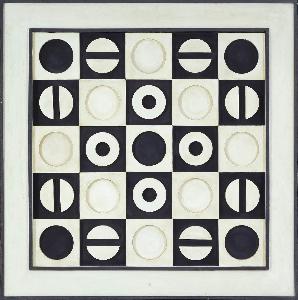Dolores Soldevilla Nieto
Dolores Soldevilla Nieto;Loló Soldevilla;Lolo Soldevilla
Place: Havana
Born: 1901
Death: 1971
Biography:
Dolores "Loló" Soldevilla Nieto was a Cuban visual artist primarily known for her role in concrete art. Born in 1901 in Havana, Cuba, Soldevilla was an avid painter, sculptor, collage artist, and draughtsman. In addition to being a journalist and teacher, she was influenced by the European avant-garde, most notably abstraction.
Early Life and Career
Soldevilla graduated from the Falcón Conservatory for singing and the violin, founding the short-lived group La Orchestra de Loló before taking up painting in 1948. During the 1930s, she was a seminal political activist, enduring detainment for participation in several political rallies, as well as imprisonment in the Prison for Women in Guanabacoa, in 1935 for her positions against the Machado dictatorship.
Artistic Development and Influences
In 1949, Soldevilla traveled to Paris as a cultural attaché for the Cuban Embassy and enrolled in the Académie de la Grande Chaumière, where she started to develop works that would later on that year, encompass her first two shows. Among her returns to Cuba, Soldevilla traveled extensively during her career, she was influenced by the avant-garde of several countries in Europe and Latin America including Spain, Switzerland, the Netherlands, Belgium, Great Britain, Austria, Germany, Venezuela, and Brazil among others.
Notable Works and Contributions
Soldevilla's take on geometric abstraction played an important role in the development of concretismo in Cuba as well as in the international scene. Her collage work from this period is a study of the geometries of circles, rectangles, and other shapes. Some of her notable works include Camino convergentes and Untitled, which can be found on Wikioo.org. For more information about the artist, visit her page on Wikioo.org or check out her biography on Wikipedia.
- Soldevilla was a key figure in the development of geometric abstract art in Cuba.
- She was a member of the Havana-based group Los Diez (The Ten).
- Soldevilla was also a founding member of the Asociación de Arte Nuevo and the Grupo Antillano.
- Her work is characterized by its use of geometric forms, lines, and colors.
Soldevilla's legacy as a pioneer of Cuban concrete art continues to inspire artists today. Her contributions to the development of concretismo in Cuba and her influence on the international art scene are undeniable. To learn more about Soldevilla and other notable artists, visit Wikioo.org or check out the Museo Nacional de Bellas Artes de la Habana on Wikioo.org.





